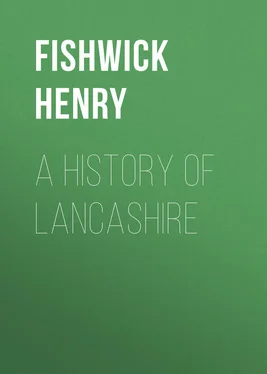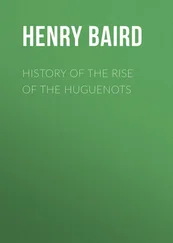Henry Fishwick - A History of Lancashire
Здесь есть возможность читать онлайн «Henry Fishwick - A History of Lancashire» — ознакомительный отрывок электронной книги совершенно бесплатно, а после прочтения отрывка купить полную версию. В некоторых случаях можно слушать аудио, скачать через торрент в формате fb2 и присутствует краткое содержание. Жанр: foreign_antique, foreign_prose, на английском языке. Описание произведения, (предисловие) а так же отзывы посетителей доступны на портале библиотеки ЛибКат.
- Название:A History of Lancashire
- Автор:
- Жанр:
- Год:неизвестен
- ISBN:нет данных
- Рейтинг книги:4 / 5. Голосов: 1
-
Избранное:Добавить в избранное
- Отзывы:
-
Ваша оценка:
- 80
- 1
- 2
- 3
- 4
- 5
A History of Lancashire: краткое содержание, описание и аннотация
Предлагаем к чтению аннотацию, описание, краткое содержание или предисловие (зависит от того, что написал сам автор книги «A History of Lancashire»). Если вы не нашли необходимую информацию о книге — напишите в комментариях, мы постараемся отыскать её.
A History of Lancashire — читать онлайн ознакомительный отрывок
Ниже представлен текст книги, разбитый по страницам. Система сохранения места последней прочитанной страницы, позволяет с удобством читать онлайн бесплатно книгу «A History of Lancashire», без необходимости каждый раз заново искать на чём Вы остановились. Поставьте закладку, и сможете в любой момент перейти на страницу, на которой закончили чтение.
Интервал:
Закладка:
The Silures , inhabiting the western part of Wales, under their King Caractacus, maintained a fierce resistance to Ostorius, but were ultimately compelled to bear the Roman yoke. At this period the Queen of the Brigantes was Cartismandua, whose betrayal of Caractacus has preserved her name from oblivion. She afterwards married a leader of the Silures named Venusius, who, according to Tacitus, was for some time under the protection of the Romans; but having been divorced from Cartismandua, she again took up arms against the invaders.
In A.D. 58 in the eastern district of Britain reigned Queen Boadicea, who, taking advantage of the Roman Governor, with many of his soldiers, being engaged in the country of the Brigantes, attacked the towns of St. Albans, Colchester and London, with victorious results, the legion being destroyed and many thousand settlers slain. This probably led to a withdrawal of the Romans for a time from the north–west, and thus left Lancashire in peace. The whole of South Britain in A.D. 62 was finally conquered by the Romans; but it was left to the Roman Governor, Petilius Cerealis, to fight out the battle with the Brigantes, who were reputed to be the most populous state in the whole province. Many engagements took place, attended with much bloodshed, and the greater part of the tribe were either subjugated or slain. 10 10 Tacitus, “Hist.,” book iii., ch. lix.
Although there is no positive evidence that any of the men of Lancashire were engaged in these struggles, it seems scarcely possible that it could have been otherwise. Cerealis was Governor from A.D. 71 to 75, and during that time he was constantly fighting battles with these hardy North–country men; but neither he nor his successor, Julius Frontinus, could effectually subdue them, and it was not until A.D. 79 that the final conquest was made by Julius Agricola, the father–in–law of Tacitus, who relates that in the spring of that year Agricola reassembled his army, and having personally carefully examined “the estuaries and woods,” he allowed the enemy no respite, but harassed them with sudden incursions and ravages, the result being that several communities, which had not before yielded their independence, submitted to the foe, gave hostages, and allowed fortresses to be erected. 11 11 Tacitus, “Vita Agricolæ,” cap. xx.
There are many reasons which make it almost a certainty that these estuaries include those of the Dee, the Mersey, the Ribble, the Wyre, the Lune and Morecambe (the Kent). Very difficult indeed must have been the task of overcoming the fierce and determined resistance offered by the natives. Much of the country was covered with timber, particularly to the west, and on every side were large tracts of moss and fen, the pathways through which were treacherous, and known only to those who used them; and Agricola was acting like a wise and experienced general when he directed his first attention to the mouths of the rivers and to the almost pathless forests.
Agricola is allowed by all historians to have been a judicious governor, and to have made efforts to accustom the conquered race to the comforts and luxuries of Roman citizens. He also taught them to build temples, houses and baths; to many of them the Roman language was taught, and they were encouraged to live together in towns and villages. Probably in his time arose the forts at Mancunium (Manchester), Bremetonacæ (Ribchester), and Galacum (Overborough).
After the middle of the second century, the Brigantes as a tribe disappear from the page of history; henceforth they are Britons.
The Hadrian Wall, which stretches for seventy miles from the Solway Firth to the Tyne, nowhere touches Lancashire, but the frequent battles which raged in its vicinity were near enough to have an effect upon the district, and no doubt occasionally the invading forces from the North penetrated into the county. The Caledonians, in A.D. 180, broke through the wall, and for some time remained masters of a considerable portion of the North of England. 12 12 Xiphiline’s abridgment of Dion Cassius. It may be well here to state my general indebtedness to the late W. Thompson Watkin’s “Roman Lancashire”; Liverpool, 1883.
In A.D. 208 the Emperor Severus, with his sons Caracalla and Geta, visited Britain, and sent some of his soldiers to the North, as he found that the inhabitants of what is now Lancashire, Yorkshire and Cumberland had not yet become reconciled to the Roman government, and, to add to the difficulty, the people on the other side of the Hadrian Wall – the Picts and Scots – required repression.
Severus died at York in 211, and for the next fifty years little is known of the Roman rule in Britain beyond the fact that the names of several legates, who acted as its governors, are on record. Between A.D. 258 and 282 the historians are also silent about this district, yet coins of Posthumus, Victorinus and Tetricus (three of the usurpers known as the “Thirty Tyrants”) have been found in various parts of Northumbria which are now known as Lancashire. In A.D. 282 the Emperor Carus gave the island of Britain to his son Carinus, who was murdered in the year following. Passing over the next two Emperors, we find Carausius has the government of Britain ceded to him, and whilst on a visit to the Brigantes’ district he was assassinated at York, A.D. 293, by his minister, Allectus, who at once usurped the purple in Britain; but not being acknowledged, a powerful force was sent against him from Rome, which met him not far from London, and in the engagement which followed he was slain and his army defeated. In the beginning of the next century, the Emperor Constantius Chlorus undertook an expedition against the Scots, and for that purpose appears to have made York his headquarters; he died in that city on July 25, A.D. 306, and his son Constantine was at once proclaimed Emperor by the garrison there stationed. The exact date of the introduction of the Christian religion into Lancashire is unknown, but we know that in 303 the Emperor Diocletian persecuted the followers of the new religion in Britain, and that the first recorded British martyr, St. Alban, died in 304 near the city which bears his name. Great must have been the change in the aspect of religious thought which, in 311, led to the conversion of Constantine the Great. This illustrious Emperor had no doubt a powerful influence over spiritual affairs in Lancashire, although the latter part of his life was not spent in Britain; he died in A.D. 337. The latter half of the century witnessed the beginning of the decline of the Roman power; the supposed unpassable Hadrian Wall was not enough to keep back the Northern warlike tribes, who, making their way through it, soon became masters of the district near its southern side, and by A.D. 368 the invaders had even reached the metropolis.
At this time was sent to Britain a great general, Theodosius, who, with a large army, drove back the Picts and Scots to the north of the Clyde; he also restored and rebuilt many of the towns and fortresses, and to him is attributed the naming of the province of Valentia, which is comprised between Solway Firth and the Tyne, and the Clyde and the Firth of Forth. All this, however, did not prevent the Picts, Scots, and Saxon pirates from re–entering the country as soon as the Roman legions were withdrawn, their services being required elsewhere. Rome, in fact, at this time was fast declining in power, and by the year 410 she had been obliged to call all her troops away from Britain, and Honorius had proclaimed Britain to be an independent state – in other words, the Romans left the country either because they could not any longer retain it, or they did not consider it worth the great drain upon their resources which it must have been.
The so–called independence which followed was so disastrous that the Britons found the last state worse than the first, and entreated their former rulers to assist them in repelling the foes they themselves were unable to overcome. They wrote: “The barbarians chase us into the sea, the sea flings us back on the barbarians; the only choice left us is to die by the sword or by the waves.”
Читать дальшеИнтервал:
Закладка:
Похожие книги на «A History of Lancashire»
Представляем Вашему вниманию похожие книги на «A History of Lancashire» списком для выбора. Мы отобрали схожую по названию и смыслу литературу в надежде предоставить читателям больше вариантов отыскать новые, интересные, ещё непрочитанные произведения.
Обсуждение, отзывы о книге «A History of Lancashire» и просто собственные мнения читателей. Оставьте ваши комментарии, напишите, что Вы думаете о произведении, его смысле или главных героях. Укажите что конкретно понравилось, а что нет, и почему Вы так считаете.












